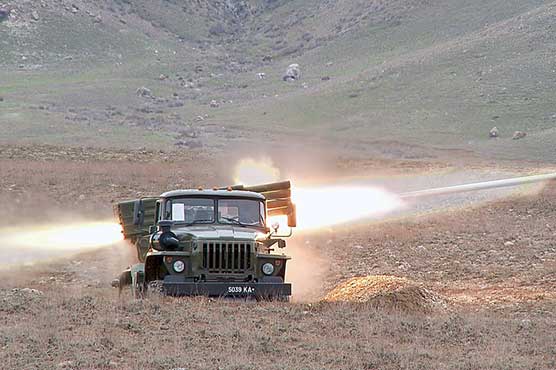31 killed in heavy clashes at Kyrgyzstan-Tajikistan border

Clashes between communities over land and water along the border are regular occurrences.
BISHKEK (AFP) - Kyrgyzstan said at least 31 people were killed after heavy clashes at its disputed border with Tajikistan, as officials from the two ex-Soviet countries met Friday in a bid to defuse tensions.
Clashes between communities over land and water along the pair s long-contested border are regular occurrences, with border guards often getting involved.
But shooting that broke out Thursday between the two militaries was the heaviest fighting in years and raised fears that it might escalate into a wider conflict.
Tajikistan, a closed, authoritarian state, has yet to officially acknowledge any deaths from the clashes between servicemen on Thursday.
The Kyrgyz health ministry said Friday that Kyrgyzstan had suffered at least 154 casualties, including 31 deaths in the latest bout of violence.
The leaders of both sides remained in touch Friday, offering hope that the conflict -- which began after communities clashed over an important piece of river infrastructure -- can be cooled.
President Sadyr Japarov of Kyrgyzstan and Tajik counterpart Emomali Rakhmon spoke by telephone on Friday, Japarov s press service said, and agreed to meet "in the second half of May".
"The heads of state agreed to resolve the current situation exclusively by peaceful means," the statement said.
Kyrgyzstan s national security chief Kamchibek Tashiyev told journalists that he had met with Tajik counterpart Saimumin Yatimov on "neutral territory" at the border on Friday.
Tashiyev pledged that problems over their shared border will be resolved "in the next few days".
In a rare statement from Tajikistan, the press service of its Sughd regional administration said that a joint Kyrgyz-Tajik working group "is making efforts with the hope of peace and friendship".
Local authorities in Kyrgyzstan s southwestern Batken region said that shooting along the shared border was still happening "periodically" despite the ceasefire.
Over 10,000 Kyrgyz citizens have been evacuated from two districts bordering Tajikistan where the fighting had been most intense, according to Kyrgyz authorities.
More than a third of the two impoverished, mountainous countries border is disputed, with the area surrounding the Tajik enclave of Vorukh, where Thursday s conflict erupted, a regular flashpoint over territorial claims and access to water.
On Friday, neighbouring Uzbekistan s leader Shavkat Mirziyoyev s office said he had held separate talks by telephone with Tajik leader Emomali Rakhmon and Kyrgyz president Sadyr Japarov aimed at easing the conflict.
Properties torched
Kyrgyzstan on Friday published a detailed list of properties in its Batken region that had been damaged, highlighting the scale of the clashes along the border
Among the properties burned down during the violence were a border post, more than 20 homes, a school, eight shops and a casino, according to the Kyrgyz emergencies ministry.
Thousands of people evacuated from villages at the centre of the conflict have been "placed in specially organised points" in Batken s administrative centre "or went to visit relatives", according to authorities in the Batken region.
Military units from the two countries began exchanging fire on Thursday, but later agreed a ceasefire following talks at several different levels of government which appeared to calm the fighting.
Tajikistan s national security committee had said earlier on Thursday that two citizens had been admitted to hospital, with one in serious condition.
Its security committee accused Kyrgyz soldiers of opening fire on Tajik troops at the Golovnaya water distribution point, located on the Isfara River, on Thursday.
It said Kyrgyz and Tajik civilians had become embroiled in a dispute over the vital piece of river infrastructure on Wednesday.
Border disagreements between the three countries that share the fertile Fergana Valley -- Kyrgyzstan, Tajikistan and Uzbekistan -- stem from demarcations made during the Soviet era.
The knotting, twisting frontiers left several communities with restricted access to their home countries.
Kremlin spokesman Dmitry Peskov said Friday that Russian President Vladimir Putin was "deeply concerned" by the clashes in two countries where Moscow maintains military bases and "always ready" to play a "mediating role."

